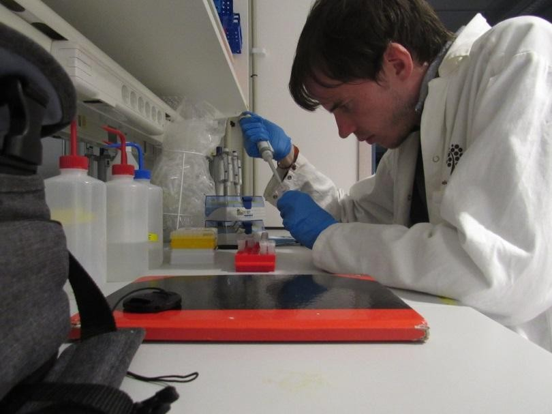Wouter Hendrycks

Wouter is a PhD student at the University of Antwerp through a FWO PhD grant. He conducts his research in collaboration with the Royal Museum for Central Africa.
One of the major questions in evolutionary biology is how new species arise. This question is especially pertinent when it comes to insects as insects represent around 50% of all eukaryote species in the world combined (e.g. animals, plants, fungi, etc.). It is thought that this insect diversity is partly driven by their interactions with plants as most insects are herbivorous with a high degree of specialization. Through an arms race between insects and their plant hosts, it has been suggested that insects undergo a repeated cycle of host plant diet shifts and expansions followed by subsequent specialization of sets of individuals for a specific host plant to adapt to the defenses of that plant. Subsequently, these “host races” diverge in separate species. While such host plant shifts have been documented in a variety of insects, it is unclear how insects are able to acquire new host plants as food sources.
In my research, I try to tackle these questions. My research focuses on the role microbial symbionts that live inside the insect might play as it has recently become clear that most animals host a diverse consortium of microbes in their body that aid in a variety of functions. Specifically I focus on the microbial facilitation hypothesis (MFH) which posits that these microbial symbionts aid the insects on feeding on their typical host plants and allow switching to novel host plants as a dietary source by detoxifying the plants toxins. In addition, insects might already harbor the metabolic flexibility to switch host plants and so my project also tries to investigate the role of the phenotypic plasticity of the insect in mediating host plant switches.
For this purpose, I study a group of tephritid fruit flies (Zeugodacus cucurbitae and Dacus flies) that are normally specialized on the highly toxic Cucurbitaceae with the larvae feeding on and developing inside the fruits. However, despite their specialization on cucurbits, in recent decades these flies have been reported to also attack occasionally species of the family Solanaceae and true fleshy fruits such as mangos.
To tackle these questions, I am trying to identify the microbiome patterns that are associated with cucurbit feeding and the changes that occur in the microbiome composition and structure when host switches occur through the use of 16S rRNA metagenomics. In addition, I am looking at the gene expression patterns associated with cucurbit feeding and in changes in gene expression following a host plant switch for both the larval gene expression and bacterial gene expression using dual RNA-seq.